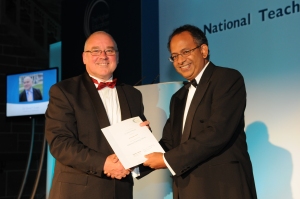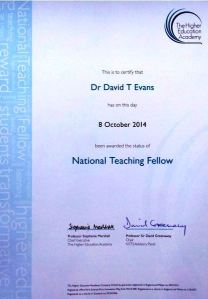NTF – Developing Excellence
“It is not what you read
but what it makes you think that counts”.
Jonny Wilkinson OBE, in Wilkinson and Black (2008)“Reflection on teaching is a key tool, a reflexive habit, a self-conscious awareness of the self in practice” (Peelo 2011: 8). This reflexive habit, supported with counselling qualifications and experience, has been fundamental to me in nursing, (priesthood) and teaching. By centring critical reflection, personal and professional development becomes inextricably bound to advancement of learners and learning. For example, when I undertook a PGCE, we used an 8-step model for Critical Incident Reflection. I regularly use this model and have adapted it for one of the Sexual Health Skills (SHS) course assignments. To ‘practice what I preach’, I underscore teaching with the Extended PLISSIT (Ex-PLISSIT) model by Taylor and Davis (2006). This involves Permission [giving]; Limited Information; Specific Suggestions and Intensive Therapy. Crucially, for me as practitioner, this is extended to Self-Awareness; Reflection; Review (of practice); Knowledge (development), and Challenging Assumptions (self and others). My latest publication was promoting this model.
Critical reflexivity – before, during and after teaching – means ‘in practice and on practice’. This is crucial for using humour in ‘sensitive’ teaching. The humour I employ must be ‘judicious’, i.e. humour that breaks down barriers; enabling people to deal with the embarrassing or abject in life; facilitating therapeutic rapport. Gratuitous humour would cause offence and be counter-intuitive for education. In clinical and educational sexual health, people may laugh out of sheer embarrassment or fear at being laughed at. It is laughing with someone not at them that enables, a fact recently brought home to me in an anonymous article I reviewed for Journal of Advanced Nursing: ‘“You need a good sense of humour, don’t you?” Masculinities, humour and care for penile cancer’.
Significant professional and academic developments are shown throughout my CV. Recent ‘in-house’ developments have included constructive annual appraisals and study opportunities on Information Technology and e-learning: WebCT; BannerWeb; Moodle design and enhancement; Adobe Connect and Prezi. I have also presented 3 research seminars on aspects of my doctoral studies and using Queer Theory as an epistemology in healthcare; embarked on the GOLD Scheme (Greenwich Opportunities for Learning Development) for Senior Fellowship of the Higher Education Academy and undertaken a 3-day course for new doctoral supervisors. The latter has been supported by a wealth of associated self-directed study to be the best supervisor I can be. I plan to undertake formal Systematic Reviews training soon, especially to help clarify apparent contradictory evidence on masturbation in relation to prostate cancer.
At a Peer Observation of Teaching (PoT), Professor Liz Meerabeau wrote:
The topic of HIV and AIDS has crucial additional aspects. It requires a knowledge of recent social history, and the ability to address sensitive and potentially embarrassing issues concerning sexual behaviour, on which some students, and members of the general public, may have pronounced views. David’s forte is his ability to address these issues in a way which is witty, but always kind and inclusive, exemplifying the UKPSF professional values.”
This is a prime opportunity for me to reflect and critically consider alternative approaches to my presentation of learning. For example, when a class member mentions the stigmatising aspects of HIV infection or AIDS, I can give them a 30 year potted history lesson on the impact of stigmas related to HIV in healthcare provision. However, in a time-limited session, the ‘luxury’ of exploring the wider domains of HIV client care, such as this, may take us too far away from the stated learning objectives of the individual course. I must balance intended learning outcomes with individual learners’ enquiries.
Another example relates to a presentation I gave on Feminism. I am thankful for previously having gained insights from studies at the LSE Gender Institute. I used an animated image to demonstrate a particular point. After the session, a student came up to me and said that she found the image potentially demeaning of women. I listened to her, agreed with her comments and invited her to consider some additional ways of thinking on this. Reflecting on my response both at that time and afterwards, i.e. in practice and on practice, was in line with the ExPLISSIT model I have mentioned above. We both explored our meanings, understandings and alternatives together. I thanked her for having the courage to raise this topic and asked for her permission to outline our discussion in feedback to her class (anonymously). She agreed. I therefore outlined our discussion in the PowerPoint presentation uploaded to the course Moodle. I was acutely aware of potential power dynamics between teacher / student; older / younger; male / female. Similarly, before, during and after session reflection was critical with the explicit language exercise I referred to in Criterion 2, from Inga Muscio. I had to think long and hard about risks of doing that exercise with a completely diverse group (ages, sexualities, genders, and most particularly, people from orthodox and traditional cultures and religions). The fact that, as a relative stranger to a class of around 100, I had a standing ovation provides evidence that the risk paid off (on that occasion) and the educational initiative was evaluated a success.
With my three professional backgrounds coupled with the teaching and research experiences I bring to my post, I have wonderful opportunities for celebrating diversity and challenging gender and sexuality prejudices. Frequently I tactfully and respectfully counter religious homo- and erotophobia in the classroom – not a problem, given years of Biblical and Theological studies – but my underlying principle is always that “honey goes down easier than vinegar”.
The final ways I demonstrate contributions that significantly improve student learning experiences at the wider (strategic) level, include: regularly raising the voice of nursing education at the All Party Parliamentary Group for Sexual and Reproductive Health. I previously contributed to the nursing and education groups of the Department of Health’s National Strategy for Sexual Health and HIV. I also provided evidence on sexual health / teenage pregnancy education for nurses to the London Assembly, and was seconded to present 2 workshops at the International Council of Nurses Congress in Taiwan. After developing the Sexual Health Skills course, I participated in ‘road shows’ across England, with the Department of Health, as evidence of ‘Achieving Excellence in Sexual Health Training’. I also presented the SHS course to the Matrons-in-Chief Conference (2005) for Her Majesty’s Armed Forces, leading to University of Greenwich being the provider of sexual health degrees to the Army. Importantly, I try my best to relate strategic level initiatives for the benefit of individual learners.
“David. To one of earth’s few remaining angels. Thank you for your kindness, continued support and inspiration. Words alone cannot express my appreciation for your time and effort. From a very grateful student xxx”
An NCO, QARANS, 1st class honours sexual health graduateConclusion
My colleague, Helen says:
“David is highly thought of within [our] department and I have heard staff commenting on his inspiring methods of teaching and his ability to engage with his students.”
Whether in one-to-one encounters or working strategically, nationally, I aim to be wholly transformative in the learning and education I promote. In 2001, when I authored the education section of the RCN Sexual Health Strategy I suggested how the career trajectory for nurses in sexual health would / should be mapped across to Graduate, Maters and, increasingly, Doctoral level studies. My more recent work with NHS London Sexual Health Programme saw this ‘dream’ get a step closer.
My concluding evidence comes from the SFHEA reference for me, by Colin Roberts, FRCN:
“David is well recognised as one of the leading authorities on sexual health theory in the United Kingdom. […] He is one of the most humble but knowledgeable educators in sexual health. His ability to connect with all learners, embrace difference in culture, religion and understanding has enabled many many students and members of the agencies he has worked for to be able to broaden their own outlook on the issues that surround sexual good health.”
References
Allen, M. (2007). Designing Successful e-Learning: Forget What You Know About Instructional Design and Do Something Interesting. West Sussex, John Wiley and Sons.
Burge, L. (1988). “Beyond Andragogy: Some Explorations for Distance Learning Design.” Journal of Distance Learning 3(1): 5-23.
Burgess, H., S. Sieminski and L. Arthur (2006). Achieving your doctorate in education. London, Sage Publications Ltd.
DH (2005). Quality Standards for Sexual Health Training. London, Department of Health.
Felman, J. L. (2001). Never a Dull Moment – teaching and the art of performance – feminism takes centre stage. London and New York, Routledge.
IAG-SH (2007). Independent Advisory Group on Sexual Health – Annual Report 2005-2006. London, Department of Health.
Lawler, J. (1991). Behind the Screens: nursing, somology and the problems of the body. Edinburgh, Churchill Livingstone.
McVeigh, H. (2009). “Factors influencing the utilisation of e-learning in post-registration nursing students.” Nurse Education Today 9(1): 91-99.
Muscio, I. (1998). Cunt: a declaration of independence. Canada, Seal Press.
Peelo, M. (2011). Understanding supervision and the PhD. London, Continuum.
Taylor, B. and S. Davis (2006). “Using the extended PLISSIT model to address sexual healthcare needs.” Nursing Standard 21(11): 35-40.
Wilkinson, J. and S. Black (2008). Tackling Life: striving for perfection. London, Headline.

